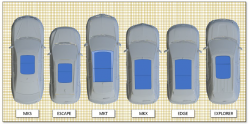
— A Ford sunroof lawsuit has failed class action certification after the judge ruled the plaintiffs failed to show there was a common defect with the panoramic sunroofs that allegedly shatter.
According to the lawsuit, plaintiff Jessica Beaty was driving her 2013 Ford Escape in February 2017 when the panoramic sunroof (PSR) suddenly exploded and rained glass onto her and her young daughter.
Beaty filed the Ford sunroof lawsuit in March 2017 alleging the panoramic sunroofs are defective in multiple Ford and Lincoln models. The latest version of the lawsuit includes these vehicles.
- 2007–2014 Ford Edge
- 2013–2017 Ford Escape
- 2011–2017 Ford Explorer
- 2007–2015 Lincoln MKX
- 2010–2017 Lincoln MKT
- 2009–2016 Lincoln MKS
A judge dismissed the lawsuit in 2020 but the plaintiffs appealed the dismissal and in April 2021 the Court of Appeals for the Ninth Circuit reversed the lower court's order.
According to the Ninth Circuit, "there is a triable issue of material fact regarding whether Ford knew about the risk that the PSRs would spontaneously shatter in its 2013 Ford Escape model." Additionally, "a reasonable juror could find that the risk of a spontaneously shattering PSR is material to consumers."
Based on the remand to the lower court, the district judge ruled on the motion for class action certification.
Judge Denies Ford Sunroof Lawsuit Class Action Certification
According to the judge, the plaintiffs argue the central common issue in the sunroof lawsuit is a defect in the panoramic sunroofs and “their propensity to shatter unexpectedly and spontaneously due to the deficiencies making them unable to withstand the rigors of ordinary and expected use.”
The plaintiffs allege the evidence shows common defects in panoramic sunroofs with tempered glass panels manufactured by either Webasto or Inalfa.
Ford argues a common defect isn't possible because there are “significant differences” among the sunroofs, including the sizes, locations and configurations. (See photo above)
Ford also references the vast difference among claim and replacement rates of the sunroofs in different models.
The plaintiffs admit there are differences in the height, width and shapes of the various vehicles and the distance of the sunroofs from the bumpers.
However, the plaintiffs claim the differences “are of no consequence” because “it does not matter how Ford placed the tempered glass on Class Vehicles, it should not have done so at all, regardless of location, orientation or geometry.”
Judge Zilly ruled in favor of Ford by finding the plaintiffs don't show a common defect among the panoramic sunroofs and have "not provided sufficient evidentiary support for their argument that a common PSR defect exists due to certain common design features."
According to the judge, Ford's evidence shows the different designs, sizes, locations, etc. affect the chances of the sunroofs shattering. This is demonstrated by the various claim and replacement rates which vary among different models.
"In light of the significant variations in the PSRs’ designs and propensities to shatter, Plaintiffs have not demonstrated a common defect. Nor have Plaintiffs shown by a preponderance of evidence, based on the current record, that the PSRs are commonly defective due to the use of tempered glass. Ford’s use of tempered glass is not unique to the Class Vehicles’ PSRs, as other car manufacturers also used tempered glass in their PSRs." — Judge Zilly
And although the plaintiffs allege Ford has known about sunroof defects in all the vehicles since at least 2008, the judge agrees with Ford's argument that the plaintiff's evidence "merely establishes that what it knew and when varied for each make, model, and model year defined as a Class Vehicle."
The judge says the evidence is enough to show a "triable fact exists on whether Ford knew of a PSR defect in Plaintiffs’ 2013 Ford Escape."
However, the evidence doesn't show Ford knew of sunroof defects in all the vehicles at the same time, "or that Ford’s knowledge of one Class Vehicle’s PSR defect can be reasonably imputed to all other Class Vehicles’ PSRs."
The Ford sunroof lawsuit was filed in the U.S. District Court for the Western District of Washington: Beaty, et al., v. Ford Motor Company.
The plaintiffs are represented by the Terrell Marshall Law Group, Simmons Hanly Conroy LLC, and Greg Coleman Law PC.




